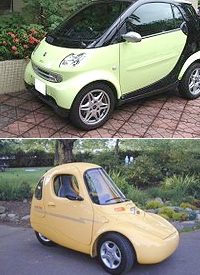
If the Obama administration gets its way, you can kiss your next SUV — and possibly your life, if you're involved in an automobile accident — goodbye. The administration is proposing a doubling of current federal gas mileage standards by 2025. New cars manufactured in that year would be required to meet a Corporate Average Fuel Efficiency (CAFE) standard of 56.2 miles per gallon, which the New York Times calculates “would require increases in fuel efficiency of nearly 5 percent a year from 2017 to 2025.”
According to the Newspaper of Record, these new standards will “reduce global warming emissions by millions of tons a year and cut oil imports by billions of barrels over the life of the program,” “sav[e] consumers billions of dollars at the pump,” and create “a truly global automobile market” by aligning U.S. standards with those of Europe, China, and Japan.
These alleged benefits, however, will come at both a monetary and a human price. Cars will likely be more expensive; see the $40,000 Chevrolet Volt, for example. They will certainly be smaller and lighter and, therefore, less safe for passengers, as Walter Williams explained in a 2010 column:
According to a Brookings Institution study, a 500-lb weight reduction of the average car increased annual highway fatalities by 2,200-3,900 and serious injuries by [between] 11,000 and 19,500 per year. A National Highway Transportation and Safety Administration study demonstrated that reducing a vehicle’s weight by only 100 pounds increased the fatality rate by as much as 5.63 percent for light cars, 4.70 percent for heavier cars and 3.06 percent for light trucks. These rates translated into additional traffic fatalities of 13,608 for light cars, 10,884 for heavier cars and 14,705 for light trucks between 1996 and 1999.
In addition, the notion that increased CAFE standards will lead to less oil importing and gas consumption is demonstrably false. “In 1975, before CAFE, we imported 37 percent of our petroleum requirements,” wrote Michael Heberling in 2006. “According to the government’s Monthly Energy Review of July 2005, with CAFE we now import 64 percent. CAFE neither reduced America’s use of foreign oil nor lowered our consumption of gasoline.”
Of course, none of this matters to the folks in Washington, who are intent on enforcing an ideological agenda regardless of the facts or the Constitution, which gives the federal government no authority to dictate gas mileage or emissions standards in the first place. To them, fighting “global warming” or reducing oil imports — the latter a worthwhile objective that could much more effectively be accomplished by cutting, rather than piling on, regulations — is so important that nothing must be permitted to stand in their way.
The government was able to dictate higher CAFE standards to the auto industry with little resistance in 2009, when the industry was in the doldrums and two of its leaders, Chrysler and General Motors, were completely at the mercy of the feds. Today, with the industry in somewhat better shape and Chrysler, at least, on its way to independence from Washington, automakers are fighting back. Writes the Times:
The auto companies are asking the government to phase in the standard gradually, to allow credits for using certain technologies and fuels and to include a review period that could lower the target if it proves too costly, industry and government officials said. They are also seeking assurances that the government will help build the charging stations needed for electric and plug-in hybrid-electric vehicles, which will help to meet the new standard.
Probably the new standard will not be as high as the administration is currently proposing. According to the paper, “A senior administration official, insisting on anonymity because the negotiations were continuing, said the 56.2 m.p.g. goal represented the government’s opening bid, and might not be the final figure.”
One might think that Congress, more conservative than it was two years ago, would have something to say about the proposed standards. However, as the Times points out, Congress “is not really a party to the negotiations,” the result of unconstitutionally delegating its powers — and delegating unconstitutional powers — to the executive branch bureaucracy.
In the end, the new standards, particularly if they are near the government’s current proposal, will force consumers to purchase the types of vehicles the government thinks are best for them, regardless of their individual preferences. Reports the Times:
“To reach a 56 m.p.g. standard would mean a tremendous shift in the types of vehicles consumers buy,” the National Auto Dealers Association said in a statement. The group said that hybrids and plug-in electric vehicles now account for less than 3 percent of the domestic market, while meeting the new standard could require the fleet to be more than 50 percent hybrid or electric, an assertion disputed by advocates of the new rule.
Or, as Gloria Berquist of the Alliance of Automobile Manufacturers put it so succinctly, “We can build these vehicles. The question is, will consumers buy them?”
They will — but only if Washington, as seems increasingly likely, doesn’t give them any choice in the matter.



